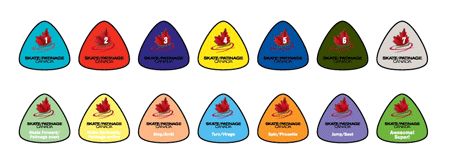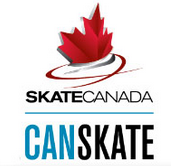What is CanSkate?
CanSkate is a dynamic learn-to-skate program that focuses on fun, participation and basic skill development. Based on Sport Canada’s long term athlete development (LTAD) principles, CanSkate centers on physical literacy and the fundamental skills needed to take part in any ice sport or to skate as a recreational activity.
Who’s it for?
For existing skaters of all ages, children or adults, as well as for those wishing to improve their basic skills whether their focus be for figure skating, hockey, speed skating or just skating for fun.
Who teaches it?
NCCP-trained professional coaches, assisted by trained program assistants (volunteers).
What will you learn?
A complete series of balance, control and agility skills taught in six stages of learning that pertain to hockey, ringette, speed skating and figure skating as well as general recreational skating. CanSkate uses nationally-tested and proven curriculum and delivery methods that guarantee skater success in developing stronger basic skills and developing them faster.
What can you expect?
Action, movement and fun! Lessons are given in a group format with a coach-to-student ratio of a maximum 1:10. Skaters progress at their own rate and coaches make sessions active using teaching aids, upbeat music and a wide variety of activities that create a motivational environment and promote learning. Badges, ribbons and other incentives are used to benchmark skaters’ progress and reward effort and participation.
CanSkate Program Curriculum at Fergus Skating Club
Canskate is divided into six levels called stages of learning, each with three fundamental areas of skating skills.
The Fundamental Areas are:
- Balance: Concentrating on most forward skills, pushing technique and edges.
- Control: Concentrating on most backwards skills, stopping and speed elements.
- Agility: Concentrating on most turning and jumping skills.
The awards consist of:
- Three Fundamental Area ribbons for each stage
- Six stage badges
To receive a stage badge, skaters must achieve all Fundamental Area ribbons (Balance, Control and Agility) from the corresponding stage. The skill requirements for each Fundamental Area are indicated on the report card.
The names of the STAGE badges are:
- Stage 1 - Balance
- Stage 2 - Glide Forward
- Stage 3 - Glide Backward
- Stage 4 - Edges
- Stage 5 - Power
- Stage 6 - Speed

The names of the FUNDAMENTAL MOVEMENT badges are:
- Go Forward
- Go Backward
- Stop
- Turn
- Spin
- Jump
CanSkate is Canada's only national learn-to-skate program. It was developed by experts to teach the fundamentals of skating in a progressive and sequential manner.
All participants must:
-
wear a proper fitting CSA approved hockey helmet. No bike helmets permitted. THIS IS A MANDATORY REQUIREMENT.
-
wear warm clothing which allows ease of movement. Splash pants to stay dry are preferable to bulky snowpants.
-
wear warm mittens or gloves. THIS IS A MANDATORY REQUIREMENT.
-
have proper fitting skates. Hockey or figure skates are both allowed. (***PLEASE AVOID USE OF PLASTIC SKATES)


